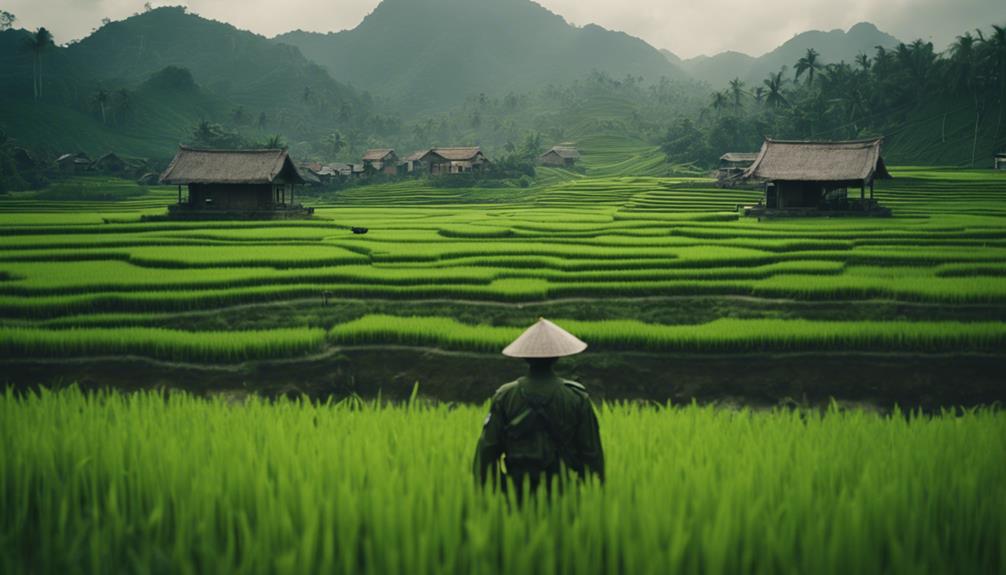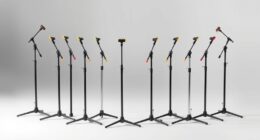Hugh Thompson stood out during the My Lai Massacre, risking his life to save Vietnamese civilians. As a helicopter pilot in the Vietnam War, he witnessed horrific events and chose to intervene by evacuating 11 people, showing remarkable moral courage. His actions challenged military ethics and highlighted the consequences of complicity. Initially vilified, Thompson's reputation evolved over time, earning him honors and recognition for his bravery. Beyond My Lai, he advocated for veterans' rights and environmental conservation. His legacy raises critical questions about accountability in war, inviting you to explore the profound impact of his choices on military ethics and human rights.
Background Information
To understand Hugh Thompson's impact, it helps to look at his early life in rural Louisiana and how it shaped his values.
You'll also want to contemplate the military honors he received, reflecting his commitment to service and ethics.
Childhood in Rural Louisiana
Hugh Thompson's childhood in rural Louisiana was shaped by a strong sense of community and values instilled by his family, which influenced his later commitment to social justice and military service.
Growing up, you'd find him actively participating in local activities that denounced racism, reflecting the principles his family held dear. His involvement in the Episcopal Church further embedded a sense of moral courage within him, teaching the importance of standing up for innocent civilians.
When Hugh enlisted in the United States Navy and later the Army, this foundation of values guided his actions. During the Vietnam War, as an American soldier, he witnessed harrowing events that would test his character.
The My Lai Massacre marked a pivotal moment, where many soldiers struggled with the brutal reality of war. However, Hugh's upbringing and the values he embraced propelled him to act decisively, risking his own safety to protect innocent civilians.
His childhood experiences in Louisiana not only shaped his worldview but also laid the groundwork for his courageous stance in one of the most tragic chapters of the Vietnam War.
Military Honors and Awards Received
Thompson's courageous actions during the My Lai Massacre earned him several prestigious military honors, highlighting his commitment to protecting innocent lives amidst the chaos of war. In 1998, you'd see him awarded the Soldiers Medal, a reflection of his bravery in saving civilians and intervening against fellow soldiers during one of the darkest moments in military history. Alongside his crew members, Lawrence Colburn and Glenn Andreotta, Thompson's heroism was recognized, with Andreotta receiving the medal posthumously.
Moreover, in 1999, Thompson received the Peace Abbey Courage of Conscience Award, further solidifying his legacy as a moral beacon in the face of wartime atrocities. His bravery didn't just end with awards; it inspired various media portrayals, including the biography 'The Forgotten Hero of My Lai' and songs by folk singer David Rovics dedicated to him.
Following his death in 2006, the military honored Thompson with burial honors, a fitting tribute that underscored his legacy as a symbol of integrity and accountability in military conduct. His recognition continues to inspire future generations to uphold these values in the armed forces.
Military Service and Humanitarian Efforts
Serving in the military not only shaped Thompson's identity as a soldier but also ignited his lifelong commitment to humanitarian efforts and ethical responsibility in wartime.
As a helicopter pilot in the Army, Hugh Thompson faced a significant moment during the My Lai Massacre on March 16, 1968. He witnessed horrific civilian deaths and took immediate action to protect innocent lives. By successfully evacuating 11 Vietnamese individuals, he demonstrated remarkable courage and moral clarity, even threatening to use his weapon against fellow American soldiers to prevent further atrocities.
Thompson's actions during this dark chapter highlighted important issues of military ethics, drawing attention to the responsibility each soldier has to uphold humanity in warfare.
After the Vietnam War, he continued his dedication to humanitarian efforts, moving into a career in the oil industry while also serving as a counselor in the Louisiana Department of Veterans Affairs.
Throughout his life, Thompson advocated for military ethics, engaging in discussions about moral courage and accountability. His legacy reminds us of the importance of prioritizing human rights, even amidst the chaos of conflict, and it continues to inspire those in military service today.
Current Updates or Main Focus

Hugh Thompson's legacy continues to inspire important conversations about veterans' rights and environmental advocacy.
As you explore his impact, consider how his actions can guide current efforts to restore historic landmarks and promote ethical conduct in military service.
These themes underscore the ongoing relevance of Thompson's heroism today.
Advocacy for Veterans' Rights
Advocating for veterans' rights remains an important mission, focusing on mental health support and the ongoing challenges faced by those who've served.
You mightn't realize how many veterans struggle with PTSD, often feeling isolated and overwhelmed. That's where effective advocacy comes into play, highlighting the critical need for robust support systems and extensive healthcare tailored to their unique experiences.
Hugh Thompson Jr. dedicated his life to this cause after his military service, emphasizing the importance of moral courage in addressing veterans' issues.
As a counselor with the Louisiana Department of Veterans Affairs, he actively helped veterans navigate their benefits and access crucial support services. His efforts didn't stop there; Thompson's speaking engagements at military academies aimed to educate future leaders on the ethical treatment of veterans, reinforcing the idea that those who serve deserve our utmost respect and assistance.
Through the Hugh Thompson Foundation, established in 2010, his legacy continues. The foundation champions veterans' rights, ensuring that their voices are heard and that they receive the mental health support they desperately need.
It's a reminder that advocating for veterans is a responsibility we all share.
Transition to Environmental Advocacy
After his military career, Thompson embraced environmental advocacy, focusing on sustainable practices in aviation and the ecological responsibilities of the oil industry. He recognized that the values he upheld during the Vietnam War—moral courage and military ethics—could extend to protecting the environment. As a helicopter pilot in the oil sector, he pushed for responsible operations that respected both the land and the communities around them.
Thompson also took on an essential role at the Louisiana Department of Veterans Affairs, counseling veterans and linking their mental health to the environmental conditions of their communities. He understood that a healthy environment contributes to overall well-being, and he advocated for this connection.
Through his lectures on Professional Military Ethics at various military academies, he integrated discussions on environmental stewardship, emphasizing that ethical military conduct must include ecological responsibility. In 2010, he founded the Hugh Thompson Foundation, aiming to promote moral courage and ethical conduct, including a strong focus on environmental advocacy.
Restoration of Historic Landmarks
Recent restoration efforts at historic landmarks related to the My Lai Massacre aim to create meaningful educational spaces that honor the victims and provoke essential discussions about wartime ethics. The My Lai Memorial Site now features monuments and exhibits that commemorate the lives lost during the massacre, emphasizing the importance of remembrance and reflection.
Preservation projects have focused on maintaining the integrity of the My Lai site, ensuring that the stories of the victims and individuals like Hugh Thompson remain a crucial part of history. Local and international organizations work together to enhance the site's visibility and accessibility, promoting educational programs that encourage discussions on military conduct and human rights.
Restoration initiatives also include developing resources for visitors to better understand the context of the massacre and its far-reaching impact on both Vietnamese and American societies during and after the Vietnam War. By engaging with these historic landmarks, you can gain insight into the moral complexities of conflict, fostering a deeper understanding of the lessons that arise from such tragic events.
Detailed Analysis
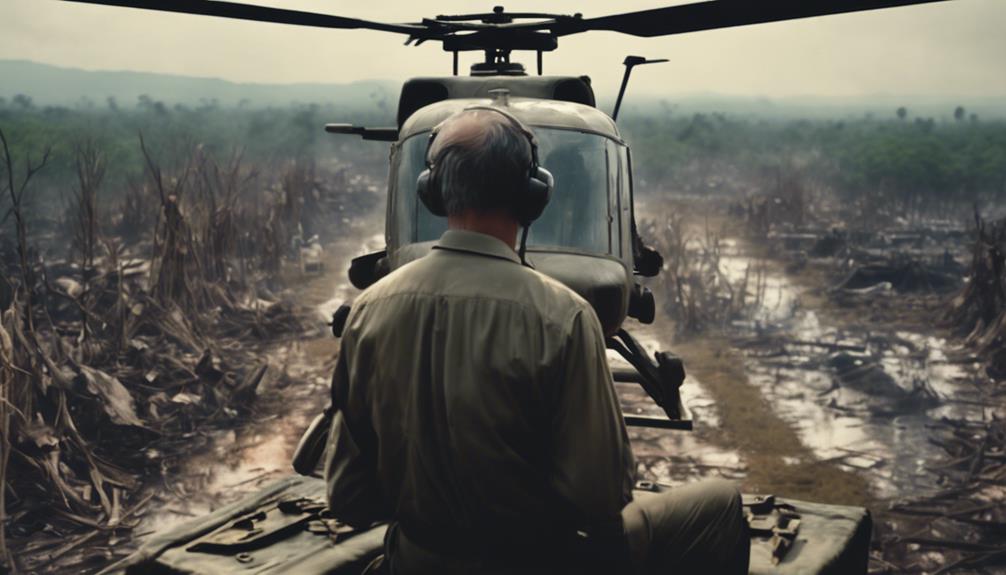
As you explore Hugh Thompson's legacy, you'll see how his environmental advocacy efforts reflect his commitment to justice beyond My Lai.
You might also consider the mixed reactions he received from fellow veterans, revealing the complexities of his role in the military community.
Recent Environmental Advocacy Efforts
Environmental advocacy efforts have surged in response to the urgent need for climate action, galvanizing millions to demand accountability from governments and corporations alike. Movements like Fridays for Future and Extinction Rebellion illustrate this growing commitment to addressing climate change. These grassroots organizations leverage social media to raise awareness, leading to significant public engagement through online petitions and hashtag campaigns.
Platforms like the United Nations Climate Change Conference (COP) provide an essential space for countries to negotiate emission reduction targets, emphasizing the need to limit global warming. COP26 highlighted the importance of corporate accountability, urging companies to disclose their carbon footprints and adopt sustainable practices in their supply chains.
Moreover, recent studies stress the necessity of biodiversity conservation, prompting advocates to push for the protection of ecosystems and endangered species. The alarming decline of global wildlife populations, as reported by the World Wildlife Fund, underscores the urgency of these efforts.
As you engage with these movements, remember that your voice contributes to a larger call for change, encouraging others to join the fight for a healthier planet.
Controversial Legacy Among Veterans
Hugh Thompson's intervention during the My Lai Massacre sparked intense debate among veterans, revealing deep divisions about moral responsibility and accountability in military service. Many veterans viewed Thompson's actions as a betrayal, condemning him for undermining their collective efforts. This backlash not only resulted in death threats directed at Thompson but also led to significant vilification from parts of the military community who felt his testimony during congressional hearings tarnished their legacy.
Conversely, some veterans recognized the profound moral dilemma Thompson faced. They acknowledged the necessity for accountability, arguing that his intervention highlighted critical ethical responsibilities during wartime. This split among veterans illustrates the complexity of military conduct and the challenges of balancing loyalty to comrades with adherence to moral principles.
Thompson's legacy continues to evoke discussions about the ethical obligations of soldiers. While his actions were controversial at the time, newer generations of veterans and military ethicists increasingly embrace his story as an essential lesson in moral integrity. They recognize that protecting civilians in conflict is crucial, transforming Thompson's controversial legacy into a powerful reminder of the importance of accountability in military service.
Reflections on My Lai Experience
The My Lai Massacre left an indelible mark on Thompson, forcing him to confront the stark realities of war and the moral dilemmas that arise when duty conflicts with humanity. You can see how Hugh Thompson's courageous actions during that harrowing day reshaped his understanding of ethical conduct.
When he intervened, landing his helicopter between American soldiers and unarmed Vietnamese civilians, he risked everything to save lives. Despite his heroism, he faced backlash, including death threats and vilification, highlighting the complex nature of accountability in wartime.
Witnessing the horrific civilian killings deeply affected Thompson, leading to post-traumatic stress disorder that haunted him for years. This underscores the psychological toll such events take on military personnel, even those who act to protect innocents.
You can reflect on how Thompson's experiences serve as a reminder of the importance of standing against wrongdoing, even at great personal cost. His legacy emphasizes the need for ethical conduct in military operations, urging future generations to prioritize humanity over blind allegiance.
In remembering Thompson, it's essential to acknowledge the sacrifices made by those who choose to uphold moral integrity amidst chaos.
Public Reaction or Expert Opinions
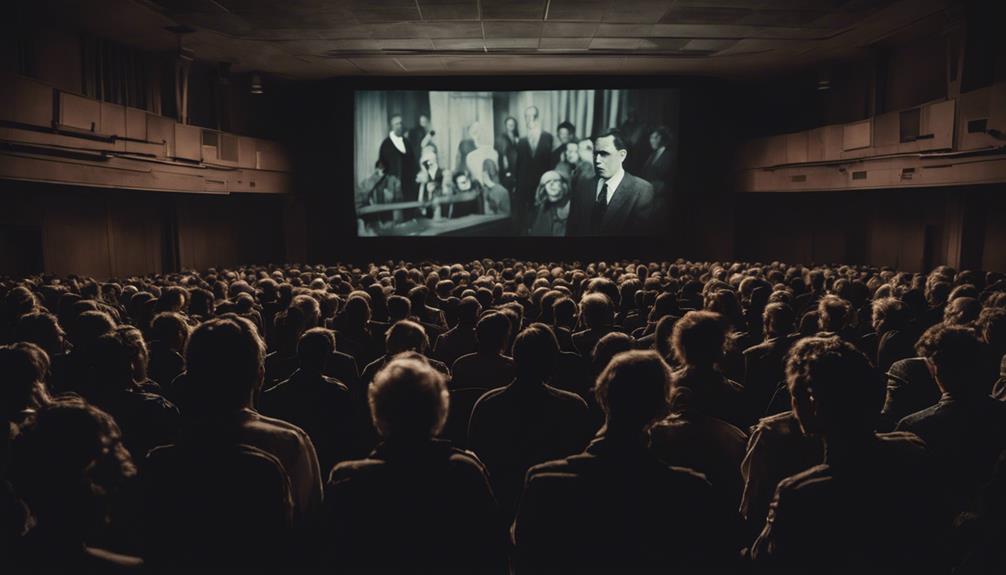
You might notice how public reaction to Hugh Thompson's actions has shifted dramatically over the years.
Initially, many condemned him, but today, social platforms buzz with praise for his heroism.
Veterans also weigh in, offering their perspectives on the significance of his courage in the face of overwhelming opposition.
Public Outcry on Social Platforms
Social media users have passionately condemned the military's actions during the My Lai Massacre, rallying around Hugh Thompson's bravery as a powerful symbol of moral courage. His decision to intervene and protect innocent lives highlights the stark contrast between individual integrity and institutional wrongdoing. This public outcry has ignited discussions about military ethics, with many arguing for a reevaluation of how soldiers are trained to confront moral dilemmas in combat.
As outrage spreads across platforms, there are calls for accountability and recognition of the sacrifices made by those like Thompson. His legacy serves as a reminder that courage often exists even in the darkest moments of conflict. Online tributes and memorials continue to flourish, reflecting a growing acknowledgment of Thompson's actions and the crucial lessons learned from the My Lai incident.
Experts emphasize that discussions surrounding military ethics should include Thompson's story, advocating for educational programs that instill moral responsibilities in soldiers. This collective response not only honors Thompson's legacy but also encourages future generations to prioritize ethics over blind obedience, ensuring that such tragedies never repeat.
Public Praise for Heroism
Many recognize Hugh Thompson as a beacon of heroism, celebrating his unwavering commitment to moral integrity during one of the Vietnam War's darkest chapters.
Initially facing backlash for his brave actions at My Lai, Thompson's legacy has since transformed into a symbol of moral courage. In 1998, he received the Soldiers Medal, with Major General Michael Ackerman commending his extraordinary ethical stance. This public praise continued in 1999 when Thompson was honored with the Peace Abbey Courage of Conscience Award, further solidifying his reputation as a principled soldier.
After Thompson's passing in 2006, his legacy gained renewed attention, as public figures and organizations expressed gratitude for his actions. They emphasized the importance of recognizing his contributions to military ethics.
The establishment of the Hugh Thompson Foundation in 2010 exemplifies this appreciation, aiming to educate others about ethical conduct in warfare and to honor Thompson's commitment to protecting innocent lives.
Through these efforts, the public continues to celebrate Hugh Thompson's heroism, ensuring that his story inspires future generations to prioritize moral courage over blind allegiance. Through these efforts, the public continues to celebrate Hugh Thompson’s heroism, ensuring that his story inspires future generations to prioritize moral courage over blind allegiance. His unwavering stand serves as a powerful reminder that integrity and ethical decision-making are essential, even in the most challenging circumstances. Just as tom hopkins sales techniques emphasize building trust and understanding human values, Thompson’s actions demonstrate the profound impact of aligning one’s principles with compassionate and courageous choices.
Veteran Perspectives on Thompson's Actions
Veterans who served during the Vietnam War often view Hugh Thompson's courageous actions at My Lai as a critical change in understanding the ethical responsibilities of soldiers in combat. Many recognize Thompson's moral courage as a stark contrast to the complicity displayed by some of their peers during wartime atrocities.
While Thompson faced backlash from fellow veterans who saw his intervention as a betrayal, others hailed him for prioritizing humanity over blind obedience to orders. His testimony during congressional hearings sparked essential discussions among veterans about military ethics and accountability.
Many began to reflect on their own experiences, grappling with the emotional toll of their actions or inactions during the conflict. Thompson's story not only highlighted the importance of moral decision-making in combat but also opened avenues for veterans to confront their struggles.
As Thompson moved to a sought-after speaker on military ethics, he influenced countless veterans to embrace accountability and ethical responsibility. This evolution in veteran perspectives underscores the lasting impact Thompson's actions had on the military community, shifting the narrative towards a more conscientious understanding of what it means to serve.
Broader Implications
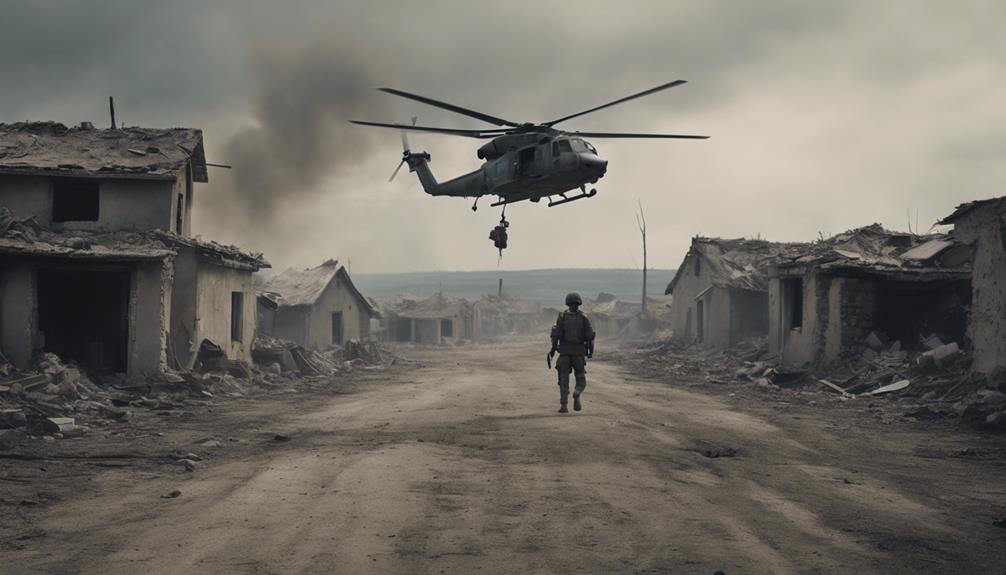
The My Lai Massacre forced a reevaluation of military ethics, leading to significant reforms in training programs.
You'll see how this event sparked a broader cultural shift, emphasizing the need for peace education and a commitment to humanitarian standards.
It's clear that the lessons learned continue to influence military practices today.
Military Ethics Training Reforms
Military ethics training reforms have emerged as an essential response to historical tragedies like the My Lai Massacre, pushing for a culture of accountability and moral courage among service members. The My Lai incident revealed critical deficiencies in military ethics training, prompting a thorough review of protocols. Now, military academies include case studies of My Lai in their ethics curricula, teaching future leaders the importance of ethical decision-making, particularly in protecting civilians during conflict.
Hugh Thompson's brave actions during My Lai serve as a benchmark for exemplary ethical behavior. His intervention highlights the necessity for soldiers to take a stand against unlawful orders, reinforcing the idea that moral courage isn't just commendable but essential. The Army's revised training programs focus on realistic scenarios that challenge service members to make ethical decisions under pressure, aiming to prevent future atrocities.
Thompson's legacy is also evident in the development of ethics manuals adopted by both U.S. and European militaries, which reference his actions as a model for moral conduct in military operations. These reforms ultimately aim to instill a sense of responsibility and accountability, ensuring that history doesn't repeat itself.
Increased Focus on Peace Education
Increased focus on peace education has become essential for fostering ethical decision-making and accountability among service members, especially in light of the My Lai Massacre. This tragic event underscored the necessity of integrating moral courage and individual responsibility into military training. By emphasizing peace education, you can help instill a sense of humanitarian principles that guides behavior during conflict.
Incorporating discussions around human rights and the consequences of wartime actions into military curricula is crucial. Such education not only prepares service members to face ethical dilemmas but also encourages them to challenge orders that violate basic human rights. Hugh Thompson's actions during the massacre exemplify how individual responsibility can lead to life-saving decisions, reinforcing the need for soldiers to act with moral courage.
Furthermore, peace education promotes cultural sensitivity, ensuring that service members understand the diverse contexts in which they operate. By fostering respect for different cultures and communities, you contribute to a military force that prioritizes de-escalation and conflict resolution.
Ultimately, a robust peace education framework can transform military operations, aligning them more closely with humanitarian values and ethical standards.
Cultural Shift in Military Ethics
A cultural shift in military ethics emerged in the wake of the My Lai Massacre, highlighting the urgent need for accountability and moral responsibility among service members. You can see how Hugh Thompson's brave actions during the massacre serve as a cornerstone for this transformation. By intervening and threatening to open fire on fellow soldiers to protect unarmed civilians, Thompson exemplified moral courage in a situation where many turned a blind eye.
In response to the My Lai incident, the U.S. Army reevaluated its rules of engagement, ensuring that protecting non-combatants became a top priority. This shift didn't just stop at policy changes; it permeated military training, emphasizing accountability for actions taken in combat. The public outrage following the massacre led to demands for greater transparency and responsibility, which continues to resonate today.
Thompson's advocacy for ethical behavior has been integrated into military ethics curricula at institutions like the U.S. Naval Academy and West Point, reinforcing the importance of moral responsibility among service members. As a result, today's military personnel are more equipped to navigate ethical dilemmas, ultimately fostering a culture that values human rights and accountability.
Frequently Asked Questions
Who Was Hugh Thompson and What Did He Do at My Lai?
You might learn that Hugh Thompson was a helicopter pilot who intervened during the My Lai Massacre, landing between soldiers and civilians, and threatening to use force to protect innocent lives from ongoing violence.
How Many Lives Did Hugh Thompson Save?
You might find estimates suggesting that Hugh Thompson saved 11 unarmed civilians during a tragic event. His bravery under fire showcased how one person's actions can profoundly impact lives amidst chaos and violence.
What Helicopter Did Hugh Thompson Fly?
You might know that Hugh Thompson flew a Bell UH-1 Iroquois helicopter, commonly called a 'Huey.' This versatile aircraft played a crucial role in troop transport and medical evacuations during intense combat situations.
How Does Thompson Save the People Hiding in the Bunker?
You locate the bunker and assess the situation. Then, you communicate with your crew and devise a plan. By landing your helicopter, you create a safe escape route, successfully evacuating the terrified villagers hiding inside.
Conclusion
In reflecting on Hugh Thompson's bravery during the My Lai Massacre, you realize the importance of standing up against injustice, no matter the consequences. His actions not only saved lives but also sparked significant conversations about morality in warfare.
As you consider the lasting impact of his heroism, you're reminded that each of us has the power to make a difference. Thompson's legacy encourages you to always choose courage over silence, inspiring future generations to act justly.

